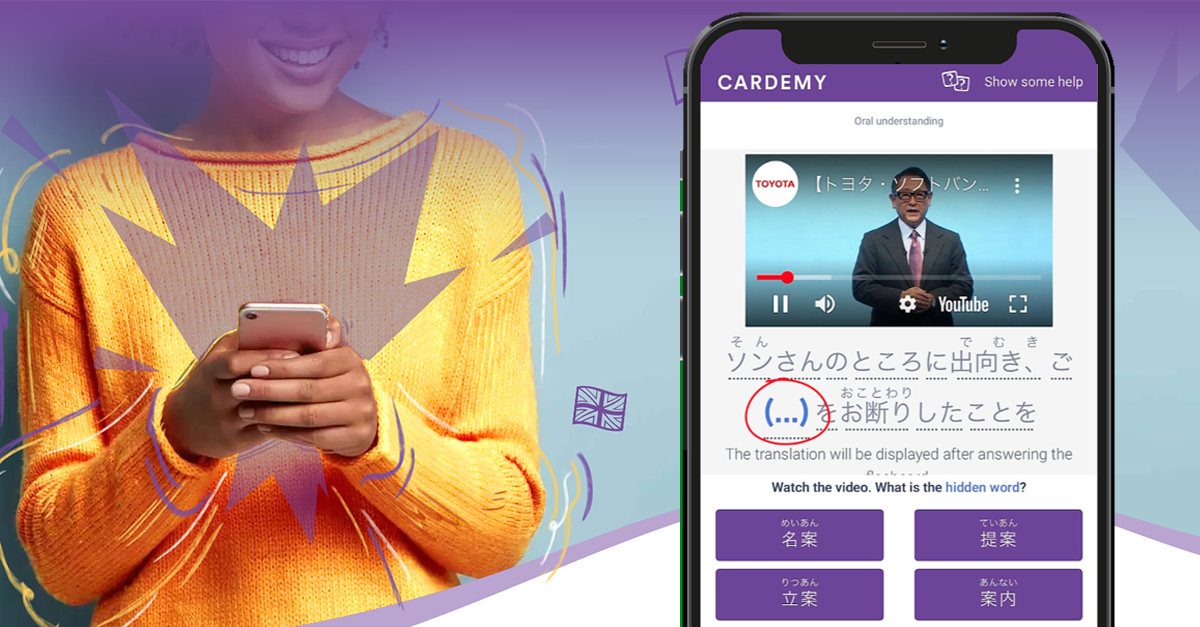When I think back to the Internet of 20 years ago, I see pages full of text, blog posts with a few dark, poorly framed photos, comments on forums illustrated with overly colorful gifs...
Today, the Internet has changed. Since the last decade, videos (YouTube, Netflix, TikTok, etc.) have become the most consumed media for Internet users. In 2020, they spent an average of 16 hours per week watching videos online! (reference: Wyzowl) This figure is constantly increasing, especially since the COVID-19 crisis.
If we like videos so much, it is because it acts on our brain in a very impactful way. Through the visual, audio and emotions they generate, they capture our attention, give meaning, promote memorization... while requiring the least effort possible.
It is therefore logical to see videos appear in all fields: sales, marketing, but also training! And language training is not left out, quite the opposite.
The top 3 searches in Google in this area is: "YouTube learn English", "Western movies practice listening" and "listening videos recommendations". Many Internet users want to practice listening and enjoy watching YouTube videos, Netflix videos, series or movies in VO to learn a foreign language. This practice improves their listening skills and they feel they can retain previously unknown words and expressions more easily. But many people wonder: how can I learn English with YouTube? How effective are movies on listening? can Western movies teach me to speak English?
In this article, I will draw your attention to 3 reasons to use videos to learn a foreign language, especially "authentic" videos (i.e. not created for language learning purposes and where the speech is not facilitated for the viewer).
Reason 1 : Learn a foreign language in an authentic way
I learned Mandarin for 5 years, in high school and then in university, before moving to China for a year. I thought I was ready for the adventure: I had very good grades at school! But when I got there, reality caught up with me: it was almost impossible for me to converse with "real" Chinese people!
When I interviewed people who live abroad or work in an international context, they all shared the same experience with me. Although they have been learning the language for some time, they all have difficulty interacting with people in the target language.
An analysis of all the causes could be the subject of a full article, but here is a brief summary of what they conclude:
- The learning program in school is more focused on passing assessments than on acquiring real language skills
- The content is too academic; the topics, situations and examples encountered are rarely used in real life and at work
- Learning content, regardless of the material, is written or spoken in a polished and outdated manner, and does not prepare for authentic language

Tomorrow's training must be oriented towards learning that best prepares learners for the future situations in which they will evolve, particularly through the practice of listening. Authentic video is an ideal tool for this purpose.
Experts in cognitive science and language teaching/learning emphasize the main and most advantageous character of the video document which is to allow contact with authentic language use. André (2018), a specialist in the sociolinguistic analysis of verbal interactions and its applications in language didactics at the University of Lorraine (France) and a member of the CNRS ATILF laboratory, states that "the authentic document is a sampling of reality.”
The authentic video offers, among other things:
- An exposure to multiple communication situations and varied social contexts. Thus, you observe variations in language: usages, accents, intonations, rhythms, melodies...
- An exposure to all the "little words of the oral language" (André, 2018), those that you do not find in books but that you encounter in real life
- An answer to your questions: how to use this word? where? when? why at this time and place?; by being confronted with authentic language, you develop automatisms and the language becomes less obscure to you
Reason 2 : Immerse yourself in the culture
To take an anecdote from my experience in China, I used to hear this question: "Have you eaten?"; and I used to answer "Yes, fried noodles, and what did you eat?". For a long time, I didn't understand why people laughed before answering me. Later, I learned that "Have you eaten?" is a way of greeting and does not expect a real answer. I was not prepared for this at school.

Authentic video is the perfect example of an immersive socio-cultural experience. You have time to observe people interacting with each other. You discover verbal and non-verbal communication (with the body, hands, face...). You discover the specificities of the culture of the country of the language you are learning, and you prepare yourself to communicate and behave with your future interlocutors.
But how can you learn English on YouTube or other platforms and get the most out of these advantages? You need to vary the sources of video you encounter as much as possible. It's best to start with what really motivates you and set achievable goals that are related to your personal interests: learning to garden, discussing the latest automotive news, understanding a series with subtitles not yet available in your native language...
Although Western movies and TV shows are great for acquiring a variety of English vocabulary, you are not fully immersed in authentic communication (what, movies aren't real life?). Here are some recommendations of videos to listen to:
- Tutorials
- Performances
- Political speeches
- Debates
- YouTubers
- Documentaries
- Entertaining TV shows
- ...
Through these media, culture and society become familiar to you. You will even get to know the country's media personalities, which can be a real asset for your future relations with your interlocutors. Through contact with the culture and social practices of the speakers of the target language, you develop an emotional bond and a comfort level that motivates you. And someone who is motivated is someone who retains better!
Reason 3 : Learn effortlessly from the situation
I like to compare learning a language through authentic videos with the experience we had as children.
Before we were even able to speak, we understood a few words and situations because of what we were experiencing simultaneously. We would cry, and our parents would ask us, "Are you hungry?" while showing us a bottle.
By dint of repetition, we did not understand the meaning or the use of each word, but the whole situation as the one where we would be fed. Until the time to try to pronounce the word "hungry" and understand that the conclusion is the same: we are fed. Finally, we try sentences, we make mistakes, but end up communicating correctly.

Our brains, whether adult or child, are predominantly visual: they analyze and understand what they see more efficiently than when they imagine. This is partly why we have to make more effort to read a book than to watch a movie. When we read "Sit at the table at the back of the restaurant", our brain makes an effort to visualize the scene. But in a movie, if someone says that same sentence, it is likely that a table at the back of the restaurant will appear a few milliseconds later... The brain favors the least effort, and that is why an untrained brain is more likely to turn to videos.
For language learning, this phenomenon is a godsend: if you didn't know the word "table", you've just understood what it means thanks to the image. With a book, you might have opened the dictionary... With video, there is no cognitive load as to the context that is there, in front of us. The words make sense in the situation. Besides, it is not rare to hear: "See, there he said that!" isn't this the proof of the direct link between the word and the situation?
Authentic video to get you closer to your goal of fluency in the language, yes but how?
As you can see, videos are very beneficial for language learning and listening practice, especially if they are authentic.
Hearing words is an unconscious and natural mechanism, while listening to words is a desired mechanism. It becomes much easier to use them when one has been confronted with them in real, visual and emotional situations.
Cross-cutting skills are also worked on, not only language skills (as stated in the CEFR descriptors, for example) but also social skills and know-how: why not learn how to sew with a tutorial in the target language, or discover good sales practices in the automobile sector thanks to a filmed interview in a large company?
To conclude, I recommend that you don't stop looking for "youtube English learning" videos, they will help you progress in your listening practice! There are many recommendations of videos for listening made by YouTubers to learn English, learn Japanese or other languages.
But to make significant progress, you need to ask yourself the right questions, including how to learn English with YouTube? While the effectiveness of listening to movies or videos is well established, it does not allow you to work on all language skills, especially oral expression.
Here are some recommendations for complementary activities to listening, most of which are offered by Cardemy:
Working on pronunciation and prosody :
- Shadowing
- Phonetic transcription
- Songs
Memorize vocabulary :
- Flashcards
- Songs
- Reading
Practice oral interaction:
- Conversations with native speakers
- Classes with a teacher
Share your favorite language learning videos in the comments below!



Leave Comment